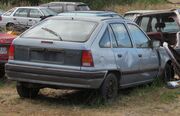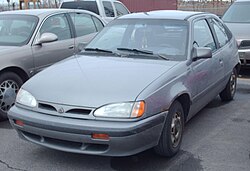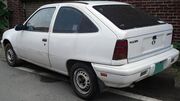Engineering:Daewoo LeMans
| Daewoo LeMans Daewoo Cielo | |
|---|---|
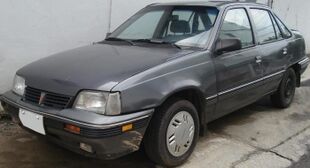 Daewoo LeMans | |
| Overview | |
| Manufacturer | Daewoo |
| Production | 1986–1997 (South Korea) 1996–2007 (Romania) 1995–2016 (license-built models) |
| Body and chassis | |
| Class | Compact car/small family car (C) |
| Body style | 3/5-door hatchback 4-door sedan |
| Layout | Front-engine, front-wheel-drive |
| Platform | GM T platform |
| Related | Opel Kadett E |
| Chronology | |
| Predecessor | Daewoo Maepsy Pontiac Acadian Pontiac T-1000 Pontiac Sunburst (Canada) |
| Successor | Daewoo Lanos Daewoo Nubira |
The Daewoo LeMans is a compact car, first manufactured by Daewoo in South Korea between 1986 and 1994, and between 1994 and 1997 as Daewoo Cielo — a car mechanically identical to the LeMans, differentiated only by its modified styling cues. Like all Daewoos preceding it, the LeMans took its underpinnings from a European Opel design.[1] In the case of the LeMans, the GM T platform-based Opel Kadett E was the donor vehicle, essentially just badge engineered into the form of the LeMans, and later as the Cielo after a second more thorough facelift.[2]
In markets outside South Korea, the original version of the car bore the Asüna GT, Asüna SE, Daewoo 1.5i, Daewoo Fantasy, Daewoo Pointer, Daewoo Racer, Passport Optima and Pontiac LeMans names. The "LeMans" nameplate was not used at all for the facelifted model. Five-door hatchback models exported to Europe were badged Daewoo Nexia with the Daewoo Racer name used seemingly at random on various bodystyles. The Daewoo Heaven name has also been used.[3]
The Cielo was subsequently replaced by the subcompact Daewoo Lanos and the compact Nubira in 1997, except in Russia where the production lasted from 1996 to 1998 and Uzbekistan where the production started in 1996 and lasted until the end of 2016. In Uzbekistan, the local manufacturer UzDaewoo Motors (later GM Uzbekistan, now UzAuto Motors) produced exclusively the second generation of the LeMans and badged it as Daewoo Nexia.
First generation (LeMans; 1986)
| Daewoo LeMans | |
|---|---|
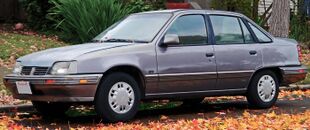 1988 Pontiac LeMans sedan (United States) | |
| Overview | |
| Also called |
|
| Production | July 1986 – February 1997[4] |
| Assembly | South Korea: Bupyeong, Incheon China: Zhanjiang, Guangdong |
| Body and chassis | |
| Class | Compact car/small family car (C) |
| Body style | 3/5-door hatchback 4-door sedan |
| Layout | Front-engine, front-wheel-drive |
| Platform | GM T platform |
| Related | Opel Kadett E |
| Powertrain | |
| Engine |
|
| Transmission | 4/5-speed manual 3-speed automatic |
| Dimensions | |
| Wheelbase | 2,520 mm (99.2 in) |
| Length | 4,260 mm (167.7 in) |
| Width | 1,662 mm (65.4 in) |
| Height | 1,393 mm (54.8 in) |
| Chronology | |
| Predecessor | Daewoo Maepsy-Na |
The original series Daewoo LeMans was available as a three-door hatchback and a four-door sedan when introduced in July 1986.[6] The LeMans was one of the first aerodynamically designed cars to be sold in South Korea, and the first to feature a digital dashboard.[7] The hatchbacks' bodywork differed in subtle ways from the German models: unlike the original, the three-door model received swing-out rear windows (not on the lowest priced models), while the five-door design used the sedan's rear doors and sloping C-pillars rather than retaining the three-door's notched window line.[8]
Sales of the LeMans in North America began in mid-1987, where it was sold as the Pontiac LeMans.[9] The LeMans was also sold in Canada through General Motors' Passport International Division as the "Optima."[10]
This car was sold in Australia as the "Daewoo 1.5i", with both hatchback and sedan bodywork.
The five-door hatchback body style was known as the Daewoo LeMans Penta5 in South Korea, while the three-door was called Daewoo Racer and only the sedan was called LeMans. Korean market cars received a 1.5-litre engine (with 89 PS or 65 kW) as there was a severe tax penalty for cars with larger engines.[11] In October 1991 the LeMans received a facelift, with a reworked front and superficially changed taillights. This version was called the Asüna SE/GT in the Canadian market, where it replaced the Passport Optima. When South Korean production of the original LeMans finally came to an end in February 1997, over 1 million had been built.[11]
Pontiac LeMans
For the 1988 model year, Pontiac began selling the LeMans as their smallest model in the United States, thereby reviving the LeMans nameplate. The captive import was offered in three-door hatchback and four-door sedan bodystyles. In Canada, GM rebranded the LeMans to market it through its short-lived Passport and Asüna brands. The Pontiac LeMans received a facelift in 1991. In North America, poor quality tarnished sales and the Pontiac LeMans and Asüna SE/GT were discontinued after the 1993 model year with no replacement. In 1994, the Asüna brand was discontinued altogether.
It was also sold in New Zealand as the Pontiac LeMans from 1989, becoming the first Pontiac badged car to be sold on the NZ market since the Canadian sourced Pontiac Laurentian of the 1960s.
Daewoo Racer
Following a complex debt deal between Czechoslovakia, Libya and South Korea, Mototechna the state car dealer imported the Daewoo Racer for 1988 and 1989 in the 1.5 saloon version.[12]
Engines
| Model | Engine Code | Years | Displacement | Weight | Power | Torque | 0–100 km/h (0-62 mph) |
Emissions |
|---|---|---|---|---|---|---|---|---|
| L4 1.5l | A15MF | 1986–1994 | 1498 cc | Non-Euro | ||||
| L4 1.6l | G16SF | 1986–1994 | 1598 cc | Non-Euro | ||||
| L4 2.0l | C20LZ | 1986–1994 | 1998 cc | Non-Euro |
Gallery
Second generation (Cielo; 1994)
| Daewoo Cielo | |
|---|---|
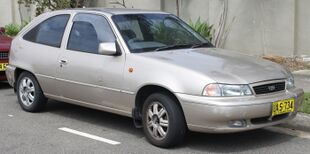 1995 Daewoo Cielo GLX 3-door | |
| Overview | |
| Also called | Daewoo Cielo (South Korea, Romania) Daewoo Heaven Daewoo Nexia Daewoo Pointer Daewoo Racer Chevrolet Nexia (Uzbekistan) |
| Production | May 1994 – February 1997 (South Korea)[13] 1995–2002 (Vietnam) 1996–2008 (Egypt) 1996–2007 (Romania) 1996–2004 (Iran) 1996–2016 (Uzbekistan) |
| Assembly | South Korea: Bupyeong South Korea: Changwon (export models only) Egypt: Cairo (Daewoo Motors Egypt) Uzbekistan: Asaka (UzDaewoo)[14] Romania: Craiova (Rodae)[15] Poland: Lublin (DMP)[16] Vietnam: Hanoi (VIDAMCO)[17] Iran: Kerman |
| Designer | Concept Group International LTD and GM Uzbekistan (2008 facelift) |
| Body and chassis | |
| Class | Compact car/small family car (C) |
| Body style | 3/5-door hatchback 4-door sedan |
| Layout | Front-engine, front-wheel-drive |
| Platform | GM T platform |
| Related | Opel Kadett E |
| Powertrain | |
| Engine |
|
| Transmission | 5-speed manual 3-speed GM THM125 automatic 4-speed GM 4T40E automatic |
| Dimensions | |
| Wheelbase | 2,520 mm (99.2 in) |
| Length | 4,482 mm (176.5 in) (sedan) 4,256 mm (167.6 in) (hatchback) |
| Width | 1,662 mm (65.4 in) |
| Height | 1,393 mm (54.8 in) |
| Chronology | |
| Successor | Daewoo Lanos Daewoo Nubira Chevrolet Agile (South America) |
The second generation LeMans launched in 1994, available as a three- and five-door hatchback and four-door sedan with a 1.5-litre eight-valve or a 1.5-litre 16-valve engine. These new models were still based on the Opel Kadett E, underpinned by the "T-car" platform. There were various trim levels available. Unlike the Kadett, there was never a station wagon version available. Some European markets got the "Lifestyle" trim level; Spain and Portugal badged their GLi/GLXi equivalents "Chess"; the Benelux countries kept the GLi/GLXi trim levels and some markets added ETi and STi specifications.[18] The GLi has an average performance with a 0–100 km/h time of 12.5 seconds and 80 PS (59 kW) at 5,400 rpm. There was also a version with single-point fuel injection and 70 PS (51 kW) for lower-spec versions.[18] The more luxurious GLXi received a sixteen-valve engine which upped the power to 90 PS (66 kW) at an unusually low 4,800 rpm, and the 0–100 km/h time was reduced to 12.2 seconds.[19]
The Cielo was made in India by DCM Daewoo Motors until the Korean Daewoo company went bankrupt. GM did not take over the Indian plant in Surajpur near Delhi and it was liquidated. Production in South Korea came to an end shortly after the 1996 introduction of the Daewoo Lanos, an original design.[20]
-
Daewoo Nexia 5-door hatchback (Europe)
-
Daewoo Nexia 5-door hatchback (rear view)
-
Daewoo Nexia 3-door hatchback (rear view)
-
Daewoo Cielo 4-door sedan (rear view)
-
Interior
Prototype
There was a prototype of the Nexia debuted in 1995 at the Seoul Motor Show - the NGV 3 (NGV meaning Nexia Green Vehicle). From the outside it looks like a regular Nexia, except that it was powered by an electric motor.[21]
Marketing and production
United Kingdom
Daewoo first exported cars to Europe in the mid-1990s, with the Nexia and Espero forming the two-model line-up in Britain from January 1995. Daewoo was the first manufacturer to sell cars on the British market directly to customers rather than setting up a conventional dealer network, and the appeal of its cars was further enhanced by the following promotions:
- A low and fixed asking price
- 3 year/60,000 mile comprehensive warranty
- 3 years free servicing
- 3 years free AA membership (which also meant giving a free courtesy car if in an inconvenience)
- Free delivery plates
- One-year free road tax
- A free full tank of petrol
- 30-day peace-of-mind refund or exchange period
- A free 'N' plate replacement in August 1995[22]
- A free mobile phone.
There were two trim levels available. The base model was the GLi which was quite well-equipped at the time, including a 1.5 SOHC (8-valve) engine, 'GLi' emblems at the body wings and boot, single-bench folding rear seat, power steering, driver's airbag and ABS. Different style hubcaps and automatic transmission were an option. After, there was the GLXi which (equipment over GLi) had a 1.5 DOHC (16-valve) engine, 'GLXi' emblems at the body wings and boot, all-round electric windows and mirrors, hubcaps, central locking, rev counter and split-folding rear seats. Alloy wheels were optional only on the GLXi. The "base" model was available for large contracts, the biggest single sale being to NHS Scotland. All models got the same four-spoke steering wheel. Most models received a 'TWIN CAM 8v' badge at the rear whilst those with automatic transmission had the 'AUTOMATIC' badge. The dealer plates had the writing 'DAEWOO' in a black background with the phone number, a black line going through either side with the number plate ID under the number plate.
When AA tested the Nexia 1.5 GLi in September 1995, they liked it due to its dealer satisfaction but criticized for being dull. In conclusion they said the Nexia is an ultra-sensible family car, with a hassle-free aftersales package and being good value for money.[23]
Despite making use of a design which was by then more than a decade old, the Nexia was one of the most popular budget family cars in Britain and helped Daewoo gain a 1% share of the new car market in 1996.[24][25] Also, air-conditioning became a free option in every Daewoo, even in the Nexia GLi 3-dr.[26][27] It was replaced there by the Lanos in the autumn of 1997, by which time some 40,000 examples had been sold.[28] Despite this, the Nexia was sold until December 1997.
Awards
At July 1997, Daewoo announced that the Nexia won the best-in-class award (beating its rivals) and the favourite model category (behind the BMW 5-Series) in the 1997 Cornhill Insurance Motor Test.[29]
Recalls
At 26 January 1996, Daewoo recalled all Nexia's since its introduction in April 1995 because of the wiring harness engine bay has been misrouted, which could have resulted in a chafing of the harness.[30]
Criticisms
The Nexia was criticized for using outdated Mk2 Vauxhall Astra mechanicals and styling hints making it dull to look at and drive for some people, especially the saloons as they were Belmont-based. In addition, its ABS control module was expensive to replace. As faulty ABS was cause for the car to fail the UK's MOT test, this could prompt owners to get rid of their Nexias. Also, it had a lot of electrical problems, and did not fare very well in reliability.[31] Spare parts were also difficult to find as it did not sell very well and the fact that its rivals sold better.
Romania
In Romania, manufacturing began in 1996, at the newly acquired Daewoo Automobile Romania factory in Craiova, being the first Daewoo model produced at the plant.[32] It was offered only with the sedan body style,[33] and was exported to most countries in Central and Eastern Europe.[34] The GLE version, which was the full option model, included air conditioning, power steering, front and rear electric windows, fog lamps, central locking, tachometer and a cassette player stereo system. Unlike models intended for Central and Western Europe, the cars sold in Romania (either imported or produced here) were never equipped with ABS or airbags.
In 2000, the model range was extended with the new Executive level, which featured a distinctive chromed grille and borrowed elements from the GLX, such as 14-inch wheels, bigger 256 mm ventilated disk brakes and the double overhead camshaft engine with 16 valves, that offered an increased power output.[35] The Executive also received an electronic ignition distributor from the Lanos. Another addition to the 2000 model was the catalytic converter respecting Euro 2 emission standards. In 2004, because of harsher emission regulations, the factory installed the Lanos 1.5 SOHC engine, which meant a decrease in horsepower, but made the car Euro 3 compliant. During the last 2 years of production, in an effort to update the optional equipment available for the car, the Executive received a CD player instead of the cassette player. It remained in production until 2007, being marketed along with its successor, the Daewoo Nubira.[36]
Uzbekistan
In Uzbekistan, UzDaewooAuto continued to manufacture the four-door sedan version of the Nexia, production of which began in June 1996.[37] It was produced alongside other Daewoo and Chevrolet models and was exported to other countries, such as Kazakhstan, Russia, Moldova, Azerbaijan and Ukraine.
At the time, the car was available with three engine options: a 1.5-litre SOHC (56 kW or 75 hp), 1.5-litre DOHC (62 kW or 83 hp) and 1.6-litre DOHC (81 kW or 109 hp). The 1.6 version has more powerful brakes and transmission with an additional long main gear.
A facelift of the car, known as the Nexia II, was presented in Tashkent, Uzbekistan, in 2008.[38] It was designed in the United Kingdom by Concept Group International LTD with cooperation of GM Uzbekistan. In Uzbekistan, it was marketed under the Chevrolet brand, while some export markets (in the CIS area) continued to receive the car as the Daewoo Nexia. Production ended in 2016. Due to the low quality control and use of cheap alloys the car constantly failed safety tests. As result of random review conducted by an independent journalist agency in 2002, the car was tested for safety according to ARCAP standards and consequently received a score of 0.6 out of 16 putting it among the least safe cars.
-
UzDaewooAuto made Daewoo Nexia (pre-facelift)
-
UzDaewooAuto Nexia (rear view)
-
Daewoo Nexia II (facelift)
-
Daewoo Nexia II (rear view)
-
Chevrolet Nexia (Uzbekistan)
-
Daewoo Nexia post and pre-facelift comparison.
The Netherlands
Production began in 1995. Two trim levels were available, the GL and GTX. The base model GL came with hubcaps, wind-up windows and manually adjustable mirrors. The GTX was a step up which included different designed hubcaps, air-con, electric windows and mirrors and a tachometer. Special editions included the 'Sport' which included front, rear and side skirts, sporty seats and alloy wheels.[39] All three body types were available. Production terminated in 1997.
Engines
| Model | Engine Code | Years | Displacement | Weight | Power | Torque | 0–100 km/h (0-62 mph) | Emissions |
|---|---|---|---|---|---|---|---|---|
| 1.5 SOHC 8V[40] | G15MF | 1996–2000 | 1498 cc | 1,025 kg (2,260 lb) | 75 hp (56 kW; 76 PS) at 5400 rpm | 127 N⋅m (94 lb⋅ft) at 3200 rpm | 12,5 s | Non-Euro |
| 1.5 DOHC 16V[40] | A15MF | 2000–2004 | 1498 cc | 1,088 kg (2,399 lb) | 84 hp (63 kW; 85 PS) at 4800 rpm | 136 N⋅m (100 lb⋅ft) at 3400–4600 rpm | 12,2 s | Euro 2 |
| 1.5 SOHC 8V | A15SMS | 2004–2007 | 1498 cc | 1,078 kg (2,377 lb) | 80 hp (60 kW; 81 PS) at 5600 rpm | 123 N⋅m (91 lb⋅ft) at 3200 rpm | 12,8 s | Euro 3 |
References
- ↑ "現代(현대)의 프레스토 大宇(대우)의 르망 起亞(기아)의 페스티바". https://newslibrary.naver.com/viewer/index.naver?articleId=1986072500209205004&editNo=2&printCount=1&publishDate=1986-07-25&officeId=00020&pageNo=5&printNo=19943&publishType=00020.
- ↑ "대우自(자),수출형 승용차「씨에로」개발 準(준)중형…오는 23일부터 시판하기로". https://newslibrary.naver.com/viewer/index.naver?articleId=1994051900209111010&editNo=45&printCount=1&publishDate=1994-05-19&officeId=00020&pageNo=11&printNo=22516&publishType=00010.
- ↑ "르망DOHC 출시 大宇(대우) 10일부터 계약". https://newslibrary.naver.com/viewer/index.naver?articleId=1993050700099109025&editNo=15&printCount=1&publishDate=1993-05-07&officeId=00009&pageNo=9&printNo=8408&publishType=00010.
- ↑ "대우자동차 - 르망 카탈로그 (-)". South Korea: Naver Blog. 2016-04-30. https://blog.naver.com/PostView.naver?blogId=ldriver&logNo=220697233567&categoryNo=55&parentCategoryNo=&from=thumbnailList.
- ↑ "大宇車(대우차) 르망LPG택시 선뵈". https://newslibrary.naver.com/viewer/index.naver?articleId=1989022200099206013&edtNo=1&printCount=1&publishDate=1989-02-22&officeId=00009&pageNo=6&printNo=7070&publishType=00020#.
- ↑ Limb, Jae-un (2010-03-08). "Blast From the Past #17: First flag-bearer of a carmaker's global ambitions". Korea JoongAng Daily. http://joongangdaily.joins.com/article/view.asp?aid=2917471.
- ↑ "대우자동차 - 르망 카탈로그 ('88)". South Korea: Naver Blog. 2016-05-12. https://blog.naver.com/PostView.naver?blogId=ldriver&logNo=220707339780&categoryNo=55&parentCategoryNo=&from=thumbnailList.
- ↑ "대우자동차 - 뉴 르망 카탈로그 ('93.09)". South Korea: Naver Blog. 2016-09-04. https://blog.naver.com/PostView.naver?blogId=ldriver&logNo=220804140884&categoryNo=55&parentCategoryNo=&from=thumbnailList.
- ↑ Stark, Harry A., ed (1989). Ward's Automotive Yearbook 1989. 51. Detroit, MI: Ward's Communications, Inc. p. 210. ISBN ((0-910589-00-9)).
- ↑ Ward's Automotive Yearbook 1990. 52. Detroit, MI: Ward's Communications, Inc. 1990. p. 248. ISBN ((0910589)).
- ↑ 11.0 11.1 Limb, Jae-un (2010-03-08). "Blast From the Past #17: First flag-bearer of a carmaker's global ambitions". Korea JoongAng Daily. http://joongangdaily.joins.com/article/view.asp?aid=2917471.
- ↑ Kupec, Martin (2023). Tuzemska i Dovazena osobni Vozidla Na Plakátech a v Prospecktech. Moto Public. pp. 366–367.
- ↑ "대우 95년형 시엘로.넥시아 탄생_ 카탈로그 (리플렛)". South Korea: Naver Blog. 2012-02-07. https://blog.naver.com/soondy7/140151546893.
- ↑ "Uz-Daewoo in figures". Uz-Daewoo. http://en.uzdaewoo.ru/in_figures/.
- ↑ "Daewoo in Romania – Istoric" (in ro). Daewoo.ro. http://www.daewoo.ro/dwr/istoric.html.
- ↑ "Historia Daewoo Motor Polska" (in pl). Daewoo.Lublin.pl. http://www.daewoo.lublin.pl/historia.html.
- ↑ "March 1995: First product built up". GM Vietnam. http://gmvietnam.com.vn/index.php/en/company/history.html.
- ↑ 18.0 18.1 Büschi, Hans-Ulrich, ed (March 10, 1994) (in de, fr). Automobil Revue 1994. 89. Berne, Switzerland: Hallwag AG. pp. 218–219. ISBN 3-444-00584-9.
- ↑ Büschi, Hans-Ulrich, ed (March 6, 1997) (in de, fr). Automobil Revue 1997. 92. Berne, Switzerland: Hallwag AG. p. 516. ISBN 3-444-10479-0.
- ↑ "대우자동차 씨에로 (Daewoo Cielo 1994) 잡지 광고". South Korea: TiStory. 2015-12-02. https://oldcar-korea.tistory.com/405.
- ↑ "Daewoo Nexia - Chronology". 2019-11-02. http://www.darewnoo.pl/samochody-seryjne/nexia.
- ↑ "Daewoo News - Free 'N' plate replacement". 2019-08-31. http://www.darewnoo.pl/GTA/naforum/pros/u/d/081.jpg.
- ↑ "The AA - Daewoo Nexia 1.5 GLi". 2019-08-31. https://www.theaa.com/staticdocs/pdf/carreports/AA_REPORTS/DAEWOO_NEXIA_1.5GLI_R9535.PDF.
- ↑ "Daewoo News - Daewoo Outselling Rivals". 2019-08-31. http://www.darewnoo.pl/GTA/naforum/pros/u/d/112.jpg.
- ↑ "Daewoo News - Daewoo approaching 1% in market after 12 months". 2019-08-31. http://www.darewnoo.pl/GTA/naforum/pros/u/d/107.jpg.
- ↑ "Daewoo News - Free air-conditioning across the range". 2019-08-31. http://www.darewnoo.pl/GTA/naforum/pros/u/d/105.jpg.
- ↑ "Daewoo News - Correction". 2019-09-02. http://www.darewnoo.pl/GTA/naforum/pros/u/d/106.jpg.
- ↑ "Daewoo News - New Models from Daewoo". 2019-09-03. http://www.darewnoo.pl/GTA/naforum/pros/u/d/119.jpg.
- ↑ "Daewoo News - Nexia wins best in class". 2019-09-02. http://www.darewnoo.pl/GTA/naforum/pros/u/d/122.jpg.
- ↑ "Daewoo News - Nexia Wiring Recall". 2019-08-31. http://www.darewnoo.pl/GTA/naforum/pros/u/d/113.jpg.
- ↑ "Daewoo Nexia (1995)". https://www.honestjohn.co.uk/carbycar/daewoo/nexia-1995/good/.
- ↑ "Prezentare Generala". Daewoo Automobile Romania. http://www.daewoo.ro/factory/default.htm.
- ↑ "Daewoo Cielo – Technical info". Daewoo Automobile România. http://www.daewoo.ro/en/modele/cielo/tehnic.php.
- ↑ "Lansare NUBIRA II". Daewoo Automobile Romania. http://www.daewoo.ro/News/default.htm#nubira.
- ↑ "Noile definitii de echipare pentru Cielo raspund mai bine nevoilor clientilor" (in ro). Daewoo Automobile Romania. http://www.daewoo.ro/News/default.htm#Cielo%20Euro2.
- ↑ "Preturi valabile la 12 martie 2007" (in ro). Daewoo Automobile România. http://www.daewooauto.ro/preturi/.
- ↑ "UzDaewoo Auto Turns 10 Years". (in Russian) daewoo.biz. http://daewoo.biz/clauses/sedan-daewoo-nexia/.
- ↑ "Cielo cu facelift" (in ro). ProMotor. 15 August 2008. http://www.promotor.ro/noutati-auto-auto-diverse/articol-daewoo-nexia-2-2552783.
- ↑ "Daewoo Espero / Nexia Brochure 1996 NL - Veikl". https://www.veikl.com/d/Daewoo-Espero---Nexia-Brochure-1996-NL-38197.
- ↑ 40.0 40.1 Jamiołkowski, Adam (April 24, 2006). "Daewoo Nexia - Trudna do przepłacenia". Auto Świat: 56–59.
Template:GM Korea Template:GM Korea timeline Template:Isuzu modern timeline
 |
